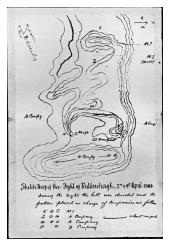Royal Irish Rifles losses at Reddersberg, South Africa.

|
| Sketch map of the action near Reddersberg |
On 3 April 1900, Captain McWhinnie and a column were on duty proclaiming the Queen's Peace and accepting the surrender of Boer farmers in the area of Reddersberg. When unexpectedly threatened by a large Boer Commando, Captain McWhinnie and his three rifle companies and one mounted company of the 2nd Battalion The Royal Irish Rifles (and one attached mounted company of the 5th Fusiliers), adopted a defensive position on a nearby feature which was too large for his small force to defend.
The Boer Commander, De Wet, conscious of the superiority of his force, invited McWhinnie to surrender, and, on receiving a curt rebuff, began the battle. The Rifles had a very uncomfortable night with little food and water. At dawn on 4 April, the Boers closed in and overran part of the position. So close were the Boers to the Riflemen that when Bugler Longhurst attempted to dash five yards from an exposed position to a safer one he fell dead into his chosen spot with nine Boer bullets in his body. Later when the infiltrating Boers split what was left of the defensive position, Captain McWhinnie surrendered to the overwhelming enemy force consisting of 4,500 Boers and four artillery guns. The Rifles' losses totalled nine killed, 26 wounded and 388 taken prisoner, with the Fusiliers' casualties numbering some 14.
When McWhinnie's force had been ordered towards Reddersberg, Field Marshal Lord Roberts had telegraphed General Gatacre about the emerging threat from De Wet's force. Gatacre failed to ensure the detachments threatened by De Wet's numerically superior force were withdrawn. Furthermore, when Gatacre's relief force was approaching, its forward scouts overlooking Reddersberg heard firing and instead of pushing on towards the fighting, Gatacre chose to retire. Although Kitchener countermanded Gatacre by ordering him towards Reddersberg it was too late for McWhinnie's doomed force. Gatacre, the commander of the disaster at Stormberg, was relieved of his command and departed for England several days later.





